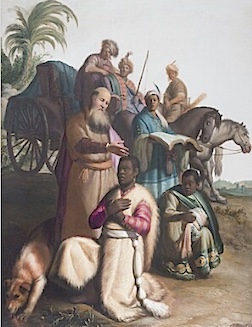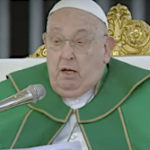Image: Rembrandt, The Baptism of the Eunuch, c. 1626
Pope Francis’ message on the occasion of the National Vocation Congress
[“Madrid-Arena” Pavilion at the Casa de Campo in Madrid, from February 7 to 9, 2025].
“.In the office, in the family, in the apostolate, in service,
take God wherever He sends you, that is the vocation “
Dear brothers and sisters:
I would like to join in the celebration of this National Vocations Congress which you have chosen as your title : “For whom am I? Gathering of those called to the mission”, to thank all those who work for vocations in the beloved lands of Spain. First of all, the gathering is for those who are sent by their bishops or superiors to carry out this task, whether they work in formation centers or simply accompany young people. The gathering is also for those who, by the example of their lives, make visible and, I dare say, contagious, the generous and trusting commitment to the project that God has for each one of us.
Without forgetting those who, through their prayers and sacrifices, obtain from God abundant graces so that we, shepherds and sheep, teachers and disciples, may be conformed to the measure of the heart of Christ.
I was pleased that the theme of the Congress took up the words of the Post-Synodal Apostolic Exhortation Christus Vivit – Christ Lives!.
Christus Vivit (number. 286). These questions should be centered less on ourselves and our own inclinations, but on others, so that our discernment leads us to see our life in relation to their lives. That is why I would remind you of the most important question of all. “So often in life, we waste time asking ourselves: ‘Who am I?’ You can keep asking, ‘Who am I?’ for the rest of your lives. But the real question is: ‘For whom am I?’”.
Of course, you are for God. But he has decided that you should also be for others, and he has given you many qualities, inclinations, gifts and charisms that are not for you, but to share with those around you.
The Christus Vivit document tells us “Often in life we waste time asking ourselves: ’But who am I?‘
We do not arrive at the fundamental question: ’Who am I for? You are for God, no doubt. but he also wanted you to be for others, and he has placed in you many qualities, inclinations, gifts and charisms that are not for you, but for others”
When I read these words again, I was reminded of the scene of the rich young man who asked the Lord what he had to do to obtain eternal life. In his answer, the Lord makes us realize, with a sweet pedagogy, that the goodness to which we aspire is not achieved by fulfilling requirements and achieving goals, and that even if we have tried to do all this since our youth, we will always lack something very simple, the total gift of ourselves, the following of Jesus in the trial of the greatest love.
This is what he asks of the rich young man: “Go, sell what you have and give to the poor, and you will have treasure in heaven; then come and follow me” (Mk 10:21).
It would seem that such a call refers only to a certain type of specific vocation, only to those who feel called to embrace the radicality of evangelical poverty.
But this is not true; we can hear it addressed to each one of us. We are all stewards of the gifts of grace and nature that the Lord has given us, and our talents are to be put in the bank and receive interest, our goods to be sold, so that the fruit may reach others.
Let us think of the DANA storm that struck several regions of Spain at the end of October.
A situation that challenges us deeply, and that brings the idea of “for whom I am” to life.
How many testimonies of courage, of solidarity, of seeing that in this context what I have, what I am, has a concrete purpose: the others. And when this is not the case, the bitterness is clear, the cry of the earth and of God that demands: “Were you not responsible for your brother?”
On the contrary, whatever we have been able to give will be found as precious jewels set in heart of mercy of his divine Heart.
It is curious that the rich young man in the Gospel does not ask to whom Jesus is sending him, he does not worry about what or how he will do when he is with them.
He worries about his goods, about what he has, about what he has done, about what he intends to achieve, even though it seems that he is looking for eternal life.
His whole world ends in him and this does not satisfy him.
In fact, although he has so much, he goes away sad because he is not able to take the step of giving.
He did not know how to invest in the essential business to which God was inviting him.
How different is the testimony of all those young people who, as we have seen in the DANA disaster, in the reception of migrants or in the volcano of La Palma, are the first to go to work.
Let us follow this example in discerning our own vocation, in order to understand the value of the spiritual or material goods we are called to manage.
Like the dishonest steward in the parable recorded by St. Luke, let us not “squander” them, by using them to alienate others from us and from God, but let us try to be able to say that we owe them nothing but love (Rom 13:8 – Owe no one anything, except to love one another; for he who loves his neighbor has fulfilled the law.). Just like the character in the parable: “How much do you owe, not to me, but to my Lord? -Take your receipt” (Lk 16:6), so that these goods may be to unite and not to divide
Let us not think that what we have is not enough, neither did the apostles have “gold or silver” but, after receiving the Holy Spirit, they try to perceive the need of the poor paralytic in the temple even beyond their expectations.
(Acts 3:1-8 – Now Peter and John were going up to the temple at the hour of prayer, the ninth hour.[a] 2 And a man lame from birth was being carried, whom they laid daily at that gate of the temple which is called Beautiful to ask alms of those who entered the temple. 3 Seeing Peter and John about to go into the temple, he asked for alms. 4 And Peter directed his gaze at him, with John, and said, “Look at us.” 5 And he fixed his attention upon them, expecting to receive something from them. 6 But Peter said, “I have no silver and gold, but I give you what I have; in the name of Jesus Christ of Nazareth, walk.” 7 And he took him by the right hand and raised him up; and immediately his feet and ankles were made strong. 8 And leaping up he stood and walked and entered the temple with them, walking and leaping and praising God),.
They did not give him money, but invited him to “look at them”, to see the example of their poverty and, having attracted his attention, they asked him to get up from his prostration. Peter makes it clear to everyone: it was not they who performed the miracle. but Jesus,
In another context, it is Philip who meets a minister of the royal treasury who, although he had come to the temple to worship the true God and being versed in the Scriptures, was unable to understand the mystery of the cross that Isaiah narrates in the story of the Servant of Yahweh.
In the same way as in the case of Peter, Philip, moved by the Spirit, manages to see the need of the other and, over and above his expectations, to announce Jesus to him, in the Word and the sacraments, attending to a poverty that is not material but spiritual.
( Acts 8:26-35 – 26 But an angel of the Lord said to Philip, “Rise and go toward the south[a] to the road that goes down from Jerusalem to Gaza.” This is a desert road. 27 And he rose and went. And behold, an Ethiopian, a eunuch, a minister of the Candace the queen of the Ethiopians, in charge of all her treasure, had come to Jerusalem to worship 28 and was returning; seated in his chariot, he was reading the prophet Isaiah. 29 And the Spirit said to Philip, “Go up and join this chariot.” 30 So Philip ran to him, and heard him reading Isaiah the prophet, and asked, “Do you understand what you are reading?” 31 And he said, “How can I, unless someone guides me?” And he invited Philip to come up and sit with him. 32 Now the passage of the scripture which he was reading was this: “As a sheep led to the slaughter or a lamb before its shearer is dumb, so he opens not his mouth. 33 In his humiliation justice was denied him. Who can describe his generation? For his life is taken up from the earth.” 34 And the eunuch said to Philip, “About whom, pray, does the prophet say this, about himself or about someone else?”
35 Then Philip opened his mouth, and beginning with this scripture he told him the good news of Jesus.).
In this Congress of vocations, let us ask of our brothers a gaze capable of perceiving the needs of our brothers, not in the abstract, but in the concrete of eyes fixed on us like those of the paralytic in the temple.. In the office, in the family, in the apostolate, in service, take God wherever He sends you, that is the vocation. With the question “for whom am I?”, we enter into the mystery of God and his plan for us, but do not be afraid and abandon yourselves to the divine will, the Spirit will surprise you at every step, and make you, like St. Teresa of Calcutta, get off the train of life, to reduce the distances that separate you from God and your brother, to change your course and find Jesus in the embrace of the One to whom you are sent.
May Jesus bless you and the Holy Virgin watch over you. And do not forget to pray for me.
Fraternally, FRANCISCO. Rome, St. John Lateran, 7 January 2025.


